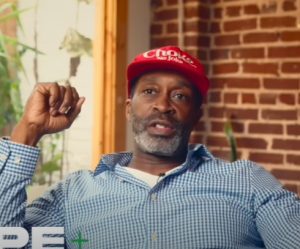In a revealing interview, media personality and former music industry insider, Choke No Joke, alleged that Sean “Diddy” Combs made advances toward him at a private party held at the house of Steve Rifkind, a notable music executive. The incident took place after a BET Awards ceremony, where Choke No Joke, Lil’ Kim, and her manager were invited to an afterparty by Diddy himself. According to Choke No Joke, the atmosphere at the party was predominantly gay, something he didn’t realize until later, upon observing his surroundings.
Choke No Joke recounted the incident in detail, describing how he felt uncomfortable and shocked by the advances made toward him. He mentioned that this wasn’t the first time he had experienced such advances in the industry, implying that this kind of behavior was not uncommon in the entertainment business. He further elaborated that Diddy’s approach was direct, making it clear that the pass was not a misunderstanding but a blatant advance. Choke No Joke managed to defuse the situation without escalating it, deciding not to react aggressively but instead choosing to remove himself from the situation.

The Presence of LGBTQ+ Themes in Hip-Hop and Industry Influence
The interview also delved into broader discussions about the LGBTQ+ community’s influence within the hip-hop industry. Choke No Joke highlighted how, in his opinion, the industry subtly introduced LGBTQ+ themes into mainstream culture, particularly through music videos and other media. He cited the example of the music video for “Big Poppa” by The Notorious B.I.G., directed by Hype Williams, where a transgender individual was featured prominently. Choke No Joke suggested that such instances were not coincidental but part of a larger agenda to normalize and integrate LGBTQ+ elements into hip-hop culture, which was traditionally viewed as hyper-masculine and often homophobic.
He discussed how the inclusion of LGBTQ+ characters and themes in such early and influential music videos was an attempt to groom the audience, making them more comfortable with these elements. This, according to Choke No Joke, was a deliberate strategy by the industry to change the cultural landscape, pushing boundaries and challenging societal norms of the time. He suggested that the presence of these themes in hip-hop videos during the 1990s was a precursor to the broader acceptance and visibility of the LGBTQ+ community in later years.
The Industry’s Role in Shaping Artists’ Lives
Choke No Joke also reflected on the careers of various Bad Boy Records artists, pointing out that many of them ended up in financial ruin or with broken careers after working with Diddy. He attributed this to a lack of knowledge about the music business among young artists in the early 1990s. He emphasized that many of these artists, including The LOX and Mase, were very young when they entered the industry, making them vulnerable to exploitation.
He went on to discuss the darker side of the industry, where drugs, sex, and parties were often used to manipulate and control artists. Choke No Joke suggested that many artists fell victim to these temptations, leading to their downfall. He also touched upon the idea that the industry grooms individuals to be more open to certain lifestyles, including the LGBTQ+ lifestyle, and that this grooming starts early in their careers.
The Broader Implications for the Hip-Hop Community
Towards the end of the interview, Choke No Joke expressed his belief that the portrayal of the LGBTQ+ community in hip-hop has been skewed to make it seem like the community is predominantly black. He questioned why the LGBTQ+ movement appears to be so heavily marketed towards black people, noting the absence of similar portrayals in other ethnic communities within the media.
Choke No Joke’s observations raise questions about the role of the entertainment industry in shaping societal attitudes and norms. He argued that the portrayal of black men as more feminine or as part of the LGBTQ+ community is a deliberate attempt to change the perception of black masculinity, which has traditionally been seen as strong and dominant. He also suggested that this portrayal contributes to the narrative of black women being unprotected, as the image of black men is being altered to fit a different agenda.
Conclusion
Choke No Joke’s interview sheds light on the complex and often controversial relationship between hip-hop culture and the LGBTQ+ community. His allegations about Diddy, along with his broader comments on the industry’s influence, paint a picture of an industry that is both powerful and potentially manipulative. Whether one agrees with his views or not, the interview offers a perspective that challenges the mainstream narrative and invites further discussion on the role of media and entertainment in shaping cultural norms.














